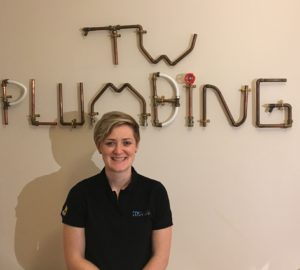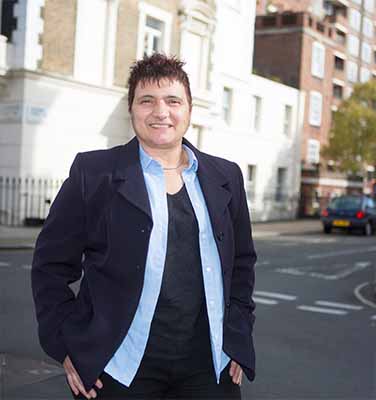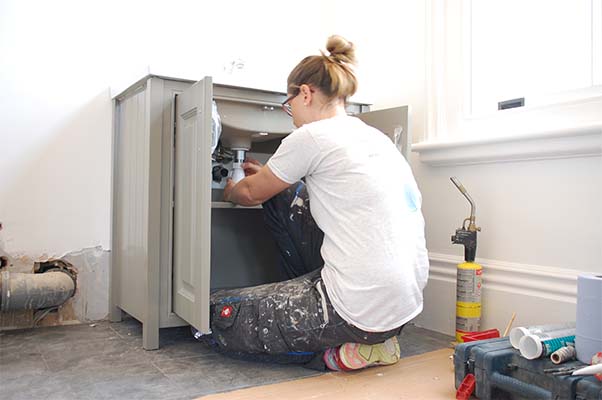When asked to imagine a plumber or an engineer, it’s likely that most people will see a man. And, although there are no official figures, best estimations suggest that for every 100 male plumbers there is less than half a woman at 0.4%. It’s true that these trades have been historically dominated by men, but times are changing. More and more women are carving out successful careers in the industry and more female school-leavers are choosing trade based apprenticeships.
Why?
Flexible hours, good rates of pay and the variety of the job seem to top of the list, but we wanted to find out more. We spoke to just a handful of women who are bringing some gender balance to the industry to find out what’s so good about being a plumber.
Lamorna Trahair-Williams
TW Plumbing Solutions, Bristol / South Gloucestershire
Lamorna is a Gas Safe registered heating engineer and plumber qualified to work on natural gas (mains) and LPG heating systems. Based just outside Thornbury, she has lived in the South Gloucestershire area for over 10 years, but not always as a plumber…

“To say I’ve had an eclectic career is a slight understatement! I left school not really knowing what I wanted to be, so I pursued jobs in sectors I had a real passion for. I spent a couple of years working for round the world sailing events before becoming a director of an adventure travel company.
“After this I then became a dispatcher in the police before joining as a PC and then being an Acting Sergeant on a response team in Bristol. So there was never any kind of clear career path! However, in every role I’ve undertaken the elements I’ve enjoyed the most are problem solving, interaction with people and an ability to work independently as well as part of a team.”
Why did you make the change from the police to plumbing?
“I loved being a police officer but I joined up just as the cuts to the police were really taking effect and in the time I was there the change was dramatic. Getting injured on duty was a regular issue […] I was based in a particularly busy station, with shifts rarely finishing on time and often without any chance of a break. These factors, combined with the toll shift work takes on you and your family, led me to decide to leave.
“But it’s my wife I have to blame for the idea of going into a trade. She is a Project Manager in Construction and initially suggested I took up a trade, on the basis that I would never be without work, could have the flexibility to work for myself/setup a company again, and have the potential to earn a decent wage. Becoming a heating engineer ticked a lot of boxes in terms of wanting to go into a trade that was highly regulated, which required studying for and attaining a high level of qualifications and something that would challenge me.”
What training route did you choose?
“I was 32 when I started training initially as a plumber and then subsequently obtaining my ACS and Gas Safe Registration. I sadly wasn’t in a position financially to be able to afford to take the apprenticeship route (with hindsight I would certainly have done so earlier in life) and therefore undertook my initial training in a private college on a ‘fast track’ course. I was incredibly fortunate to be able to work alongside a very experienced heating engineer after my initial training which allowed me the hands on learning environment required. I worked exceptionally long days to absorb as much as I possibly could, ask as many questions as I could and (possibly as a hark back to police times!) always had a little notebook of notes with me.
“I spent every evening reading training books and regulation books to learn as much as I could. I passed my ACS exams, applied for my Gas Safe registration and received excellent feedback from my Gas Safe inspection. Approximately a year after completing my initial training I was self employed and fully qualified but I unashamedly still refer to the guy who gave me that initial chance whenever I get completely stumped!”
What’s the best thing about your job?
“The constant learning, whether it’s new ways of overcoming common problems or discovering emerging technologies – there’s never a time when you don’t have the opportunity to better your skill set. The potential to develop in time from being self employed to running a company is also an exciting prospect for the future. I’ve been very fortunate to have incredible customers – I’ve never had so many boxes of chocolate or bottles of wine at Christmas!
“I think one of the main draws to this job is there isn’t really an average day! The jobs can range from boiler servicing, gas safety certificates, radiator installations or toilet repairs and everything in between. The benefit of being self-employed is that I can choose what time I start and finish work, so my hours tend to be pretty flexible.”
As a female working in male dominated industry, what kind of feedback do you get from customers?
“Elderly customers often say they feel safer with a female engineer in the house, similarly with female customers of any age. But regardless of gender, I take pride in being reliable, punctual and trustworthy, which in turn gives my customers confidence in giving me access to their homes.”
Lauren Winter
Trainee Plumber / Heating Engineer, Coventry
Having completed her initial diploma with Coventry College, Lauren is currently working on her NVQ which means she’s out and about getting as much practical, on-the-job experience as possible. It would be a busy time for anyone, but Lauren is also balancing the work alongside being a single mum to her daughter (and willing assistant!), Ellie. So, why plumbing?
“I went through lots of phases when I was growing up; at I first I wanted to be an artist (my Mum told me I could produce paintings quicker than she could dry them), then a professional horse rider, then I wanted to be a vet, then a dog walker…it could change weekly with me.
“When I left secondary school, we looked around colleges – I didn’t know what I wanted to do and completed the first year of a photography course, but thought I’d struggle in the photography world as technology was improving at a rapid rate. Looking at something where I’d be sure to have a career for life I went to the plumbing department, spoke to the tutors and submitted my application.”
Where are you in your training now?
“I originally started my plumbing diploma course at Coventry College in 2011 and I loved it very much! December came, it was just before Christmas on the night of a Christmas ice hockey match, I found out I was pregnant! Myself and my tutors agreed that it was in the best interests of the baby and myself to bring the course to a halt for the time being. Ellie was born in August 2012 and I worked in retail for a time, but in September 2017 I was back on the course knowing I couldn’t just give up; I took my giant leap into the world of construction yet again! I’ve now completed my initial diploma with all exams graded Merit or Distinction. The real work comes in at the NVQ stage which I’m working on now; I’m completing onsite based assessments and trying to get as much hands on experience as I can find.”
What’s an average day like for you when you’re on a training placement?
“When I worked in the Oxfordshire area I’d put Ellie into school at 7.45am, I’d travel 40 miles to the property we were working on, this would have usually been a full house renovation project so was the same house over the course of a few weeks. Sometimes, we’d need to go to a plumbers merchants for a few things during the day. Lunch was whenever we could put tools down…sometimes that was at the end of the day. I’d have to travel back for the school run to collect Ellie for 3.20pm.”
How do you manage being a parent alongside your training?
“It’s definitely a challenge to find enough flexibility to work around being a single mother and working a full day. This is carefully managed by family and friends along with before and after school childcare. My daughter, Ellie, is a credit to herself and completely understands the process in which we have to go through when it’s a 6am start. Fortunately she has a very adult-like mind set and we have a relationship where we are more like best friends. She will come to trade shows and friends and family work jobs and LOVES helping out. Usually she will be in charge of the Wet/Dry vac and ensure everything is ready for me to do jobs such as toilet cisterns.”
What’s been the best part of your training so far?
“My parents were originally worried that I was making a silly move, that no one would hire me and that it was an unstable career. They’ve since told me how proud they are of me! Also, I was also kindly offered the opportunity to go out on a job with a Vaillant Service Engineer; I jumped at the chance! I loved every second of it, and working towards my gas qualification is going to be a priority of mine in the near future.”
As a female working in male dominated industry, what kind of feedback do you get from customers?
“I usually get told ‘well done you’ or ‘it’s nice to see a female plumber’, but to me it’s just normal. However, I can completely understand how reassuring it could be to an elderly single female, or single mothers, having a female in the house working.”
Becky Bates
BB Plumbing, Cardiff
Becky Bates is a fully qualified & insured plumber specialising in bathroom renovations. She can help with any plumbing problem and most household maintenance queries including design creativity and project management to get the most out of small or awkward bathroom spaces. With an established business and over 9 years experience, we wanted to know if plumbing was the plan from day one.
“I was always interested in wood and metal. My dream was to combine that interest with a career in creating furniture so from school I went onto do an NVQ in cabinet making. But engineering has always been a part of my life, with my father being a metal worker and both my grandfathers were aircraft engineers. Most of my childhood was spent in my Dad’s workshop welding, on the lathe, creating all sorts of things. Design and tech on the other hand was my absolute favourite.”
What attracted you to a career in plumbing?
“I’d been in the same job for a long time, there was no prospect of progression and so I was on the lookout for something new and challenging. I saw an advert in a local paper about training to be a plumber and thought gaining a qualification in a trade would open a lot more opportunities for me. I was 25 when I went back to college.”
What training did you complete?
“It took 2 years of studying and working part time but I achieved my NVQ Level 2 in plumbing in 2008. I also have my WRAS (Water Regulations Advisory Scheme) accreditation and Unvented training.”
What’s the best thing about your career?
“Variety. Every day is different, every customer has a different story to tell, and you are always learning. My job challenges me, and I love that. There’s are so many memorable moments, but the one I remember the most is being sung to by an opera singer whilst stood in their bath fixing their shower!
“Now my main focus is re-establishing my business. I’ve recently moved to Wales and so I am essentially starting again. Over the past 10 years I’ve built a very successful business in London and I’m sure with time and hard work I will achieve the same in Wales.”
As a female working in male dominated industry, what kind of feedback do you get from customers?
“I do sometimes get work because customers prefer to hire a woman, but I’d like to think that most of the time it’s purely based on my experience, knowledge and recommendations from previous customers.”
What advice would you give to women thinking about a career in plumbing?
“Go for it! Get involved. My biggest regret is not having done it sooner. And if you can, do an apprenticeship. Hands on learning is the absolute best way in my opinion. Again, if I could have gone down that route I would have. I’m seeing more women plumbers and engineers than ever before and I’m hoping the more we see the more it will inspire young ladies to come into the industry.”
Stopcocks Women Plumbers
No article on the topic of female plumbers in the UK would be complete without Stopcocks Women Plumbers, a national franchise showcasing excellent women plumbers. The franchise was fully established in March 2017, but the story began back in 1990 when the founder, Hattie Hasan, started her career as an independent plumber:
“When I was at school, no-one encouraged me to think of taking up a trade and I was not allowed to study metalwork and engineering which was my dream at the time. After completing a psychology degree and teaching for eight years, I decided to take up a more hands on career that meant I could be in control of my life and would give me the flexibility I’d always wanted – I chose plumbing.”

Since then Stopcocks has grown and now has female plumbers and engineers covering 8 regions in the UK.
Mica May runs Stopcocks alongside Hattie and says: “We find that very many householders are only too delighted to choose female engineers when they realise that is an option available for them. Many customers say, ‘I wish I knew you existed earlier!’ We get a very high level of returning customers and a lot of business which comes as a result of recommendations through family and friends.
“At Stopcocks we’re good communicators, we won’t make a mess, we won’t patronise or talk down to our customers and some homeowners have said that they feel safer in their homes with a woman – we make sure we don’t let customers down as far as this expectation is concerned with our strict code of conduct and Stopcocks standards.”
Christina Birch is a plumber and gas engineer covering the Hertfordshire area and has built her business as a Stopcocks franchise: “Stopcocks has helped massively to build my business. The backing of a brand, marketing, tech/office support and a community of other female engineers’ brains to pick really helps.”
Can she fix it? Of course she can.
Whether they’re a Stopcocks franchise or an independent tradesperson, there are more women than ever before entering the plumbing and engineering profession, but 0.4% is still a staggeringly low figure. There is, of course, no reason why a man or a woman would be any better or worse at the job, but it’s important that everyone who wants to enter the industry is given the opportunity to do so regardless of gender, background or (in the case of career changers) age.
However, things are definitely looking up. In a recent survey by WaterSafe they found that 77% of 2,000 homeowners surveyed said the most important consideration when choosing a plumber, regardless of gender, is if they have the skills to do a good quality job. In addition, the survey found that 59% would like to see more women in the industry and 31% would actually prefer to hire a woman plumber.
Mica at Stopcocks commented:
“We organise an annual conference for women plumbers and engineers called WIT (Women Installers Together). In September 2017 it was attended by 80 delegates but at our most recent event in July 2018 this rose to 120. Since we started running the WIT conference (pictured at the top of the article) we’ve also noticed a real upturn in support from the media . We’re regularly being approached by industry websites and magazines wanting to take an active role in helping increase recruitment of more women into the plumbing and heating industry.”
So how can we recruit more women into the plumbing and heating industry? Educating women about the opportunities and training routes available to them is key, but long term change needs to begin at the school-leaver stage, i.e. ensuring both girls and boys are encouraged to take up trade apprenticeships if that’s where their interests and skills lie. Things are heading in the right direction, but there’s still lots to be done.
However, interestingly enough, change is also happening at the top. In June 2018 the professional body for plumbers in the UK, CIPHE (Chartered Institute of Plumbing and Heating Engineers), elected its first ever female president, Tracey Richardson. She touched on the subject of women in the industry in her acceptance speech, and it seems the perfect way to sum up:
“I would love to see other women following my lead and yes I do want to encourage more females into the industry, but simply by using a subtler approach of just showing there are no barriers to what you can achieve in life, only the ones you put there; but that rule applies to anyone – male or female.”
Want to Find Out More?
If you’re a homeowner interested in finding a Stopcocks Women Plumber, or a female plumber thinking of starting your own Stopcocks franchise, you can visit their website here. The next WIT conference is on 4th July 2019.
For general guidance on training as a plumber, the Chartered Institute of Plumbing and Heating Engineers (CIPHE) is the professional body for plumbers and heating engineers in the UK and can provide further information on training and qualifications.








